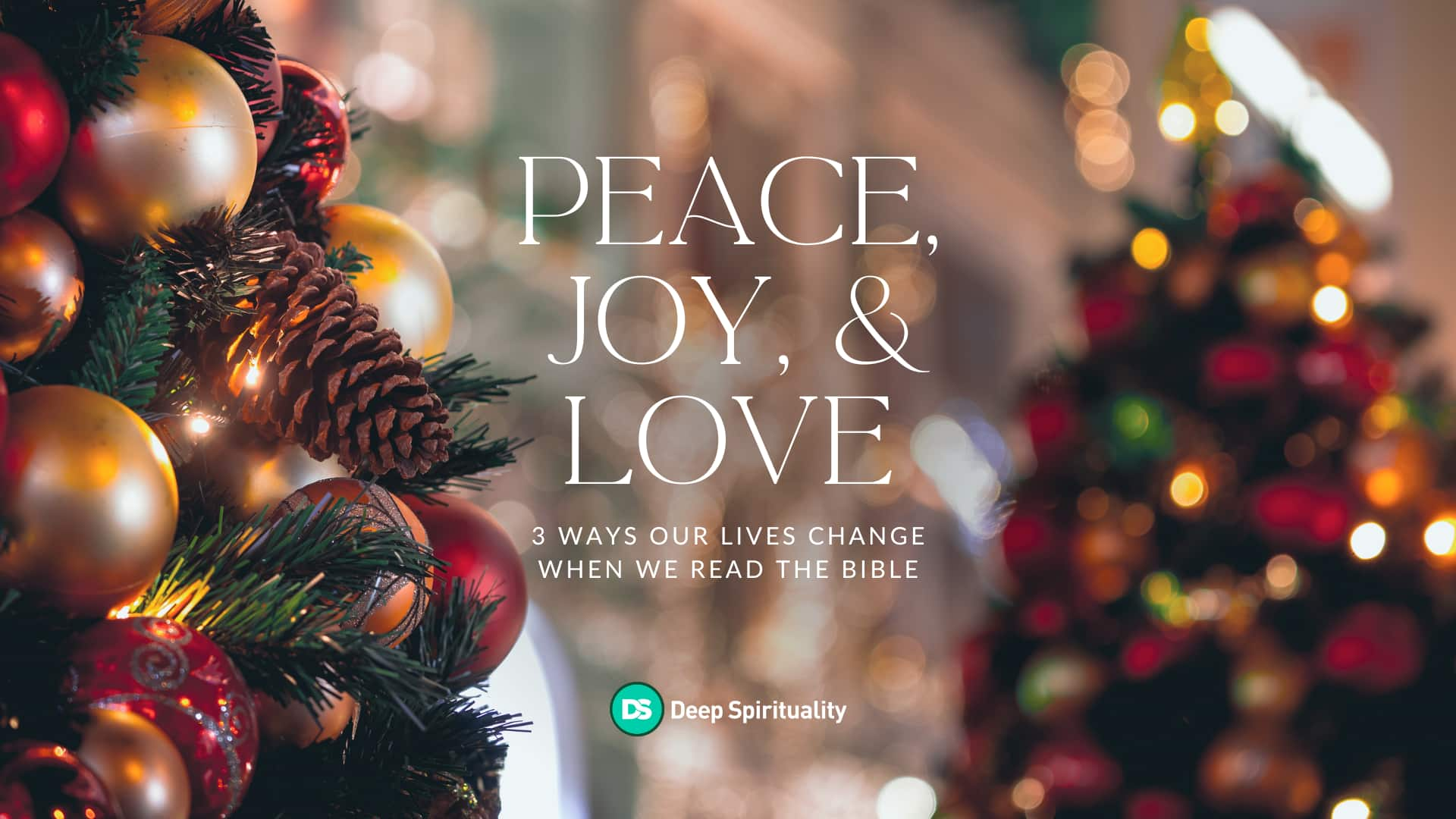What does it mean to spend time with God?
Some call this a quiet time–a special time set aside each day to listen to God through the Bible and talk to God by praying.
Although we may intend to connect with God during these times, sometimes we lose our way. Our quiet time can easily turn into a to-do item to check off our list or even a “worry time” where we think more about ourselves and our emotions than we think about God. When I have “quiet times” like this, I leave anything but quiet. I usually wind up more confused and unsettled than I was before I began.
Studying the lives of the men and women in the Bible who walked with God has been reshaping my understanding of what it means to have a quiet time. Their interactions with God were life-changing and transformative. Our quiet times shouldn’t just be another task; they should change our hearts and how we live our lives.
A quiet time is an emotional anchor
As the deer pants for streams of water, so my soul pants for you, my God. My soul thirsts for God, for the living God. When can I go and meet with God?
Psalm 42:1-2 NIV
I often have times when I know I am feeling a lot, but I’m not quite sure what exactly those feelings are or what to do with them.
This psalm helps me understand what is really going on with me emotionally when I feel swept away by my emotions: my soul is hungry for God. Just like my physical body gets hungry and thirsty regularly, my spiritual self gets thirsty too. In these moments, my body and soul are crying out saying “When can I go and meet with God?” I need God to be my anchor every day. I need him to put me at ease.

The same is true for each of us. Our souls thirst for God. They won’t be satisfied without time to meet and connect with God.
It is very easy to mindlessly read the Bible and superficially pray for a couple minutes. It takes some work to make our quiet time with God satisfying to our souls. To spend quality time with God means we do the work to be anchored and present. It means we allow ourselves to be moved, motivated, curious, and changed by God’s Word and prayer. When we spend quality time with God in the morning, we will come out of that time more grounded, more loving, more ready for our day, and more at peace with God.
All Scripture is God-breathed [given by divine inspiration] and is profitable for instruction, for conviction [of sin], for correction [of error and restoration to obedience], for training in righteousness [learning to live in conformity to God’s will, both publicly and privately—behaving honorably with personal integrity and moral courage]; so that the man of God may be complete and proficient, outfitted and thoroughly equipped for every good work.
2 Timothy 3:16-17 Amplified Bible
These verses explain the purpose of a quiet time so well. The Bible instructs, convicts, corrects, and trains us to live a new way. That’s why we can leave a quiet time more aware of God and equipped to do good in the world. We can be confident and at peace with God, because he makes us competent.
To help us have quiet times like this, I picked three people in the Bible who show us this kind of transformative relationship with God: Moses, David, and Hannah. Let’s look at how their experience spending time with God changed their hearts and the way they lived their lives.
Moses: From doubtful to faithful
Then he said, “I am the God of your father, the God of Abraham, the God of Isaac and the God of Jacob.” At this, Moses hid his face, because he was afraid to look at God. The LORD said, “I have indeed seen the misery of my people in Egypt. I have heard them crying out because of their slave drivers, and I am concerned about their suffering.
So I have come down to rescue them from the hand of the Egyptians and to bring them up out of that land into a good and spacious land, a land flowing with milk and honey—the home of the Canaanites, Hittites, Amorites, Perizzites, Hivites and Jebusites… So now, go. I am sending you to Pharaoh to bring my people the Israelites out of Egypt.” But Moses said to God, “Who am I that I should go to Pharaoh and bring the Israelites out of Egypt?” And God said, “I will be with you…”
Exodus 3:6-8, 10-12 NIV
Over the course of Moses’ life, he built a close friendship with God. He even spoke to God face to face and gave us a great picture of how we can talk to God like we would talk to a friend (Exodus 33:11). This passage of the Bible in Exodus 3 shows us the first time God appeared to Moses to have a conversation. We can learn some great lessons from this interaction between Moses and God that will help us have transformative conversations with God ourselves.
First, God identifies himself as the God of Abraham, the God of Isaac and the God of Jacob. God identifies himself with people! In just this short phrase, he shows us that he is with us in a personal and intimate relationship.
We also see God’s loving nature; he saw, heard, felt, came down, and cared for the Israelite people and planned for Moses to lead them out of slavery in Egypt.
But Moses doubted.

Have you ever felt the way Moses felt? Maybe you felt called to do something that you really didn’t want to do? This could be being honest with a friend when you see things not working well in their life, or being willing to forgive and love someone who has really hurt you, or anything else that feels too difficult to do.
Moses doubted that God was doing the right thing by calling him to grow in a way that must have felt risky and uncomfortable. Fascinatingly, God does not respond to Moses’s doubts by guiding Moses to having more faith in his own human abilities. Moses asks “Who am I?” and God’s reassurance to Moses’s identity crisis is “You are the one I am with.” He leads Moses’s faith away from self-confidence, and into more sturdy God-confidence.
But Moses said, “Pardon your servant, Lord. Please send someone else.” Then the Lord’s anger burned against Moses and he said, “What about your brother, Aaron the Levite? I know he can speak well. He is already on his way to meet you, and he will be glad to see you. You shall speak to him and put words in his mouth; I will help both of you speak and will teach you what to do. He will speak to the people for you, and it will be as if he were your mouth and as if you were God to him. But take this staff in your hand so you can perform the signs with it.”
Exodus 4:13-17 NIV
I relate to Moses so much. When I feel pushed to grow and do something uncomfortable, I look for ways to get out of it. I can even look for reasons to doubt and make up excuses for why I am not strong enough or good enough. Moses asked God to send someone else instead. He didn’t believe he was capable, but God gave him the power and friendships he needed to succeed.
If you continue reading Moses’s story in the book of Exodus, you will see that Moses and Aaron were in fact successful at leading the Israelites out of their slavery in Egypt. This conversation with God changed Moses and equipped him to faithfully carry out God’s purpose.
When we spend time talking honestly with God, he helps us and teaches us what to do. Moses wasn’t successful because of his own abilities; he was successful because of God’s power and help. God was with him and guided him the whole way, and he does the same for us today. When we rely on God like Moses did, we can experience the same confidence and peace that comes from walking closely with God.
Pause and reflect
- How is God calling you to grow and change in your life currently?
Take action
- Read all of Exodus chapters 3 and 4.
- What are some things from Moses’s conversation with God that you can learn from and imitate in your quiet times?
David: From fearful to peaceful
David is an inspiring example of someone who fought to overcome his fear. He was chosen to become the king of Israel as a teenager but had to wait until he was almost thirty before it actually happened.
In the waiting period, Saul—who was king at the time—pursued David and attempted to kill him multiple times. And once David did become king, it wasn’t just a walk in the park. He even had to deal with his own son attempting to overthrow him.
David shows us what it looks like to have challenges in life, yet still find comfort and relief in our relationship with God. David is the author of over 70 psalms in the Bible, and his words demonstrate how God helped him go from being afraid to completely at peace.
The Lord is my light and my salvation— whom shall I fear? The Lord is the stronghold of my life— of whom shall I be afraid? … Though an army besiege me, my heart will not fear; though war break out against me, even then I will be confident. One thing I ask from the Lord, this only do I seek: that I may dwell in the house of the Lord all the days of my life, to gaze on the beauty of the Lord and to seek him in his temple. For in the day of trouble he will keep me safe in his dwelling; he will hide me in the shelter of his sacred tent and set me high upon a rock.
Psalm 27:1, 3-4, 8 NIV
In the midst of hiding in caves, running for his life, living as a foreigner in enemy lands, and having friends and family wanting to take his life, David anchored himself in God. He found confidence, safety, and shelter in God.
I have never had to experience such intense danger or responsibility in leadership. Yet I can still feel the temptation to believe that I have too much going on to spend quality time with God. I can still be controlled so easily by fears and anxieties that I drown out the influence and movement of God in my heart and life.
However, David gives me hope. If he could humbly give his heart and mind entirely to God in these moments of distress, then I can too. If David, in the midst of all that was going on, with thousands trying to kill him, could seek and desire only to be close to God, then I can have that kind of dedication to and focus on God as well.
I also have found that the times I should have the least to fear—because I have everything I need—can be the times I fear the most, because I am afraid of losing it all. This usually reveals that I am trusting in myself, my possessions, my circumstances, my thoughts, and my emotions instead of God.
Pause and reflect
- What fears and anxieties tend to weigh on your heart?
- How can you find peace in God the same way David did in the passage above?
Hannah: From bitter to satisfied
Another example of a person in the Bible who had a transformative relationship with God is Hannah. She desired to have children but was barren for many years. She struggled with bitterness as she saw other women around her become pregnant and have several children.
One day, while Hannah and her husband were on their annual trip to worship God at the Tabernacle, she went to be with God and prayed about her feelings.
Hannah was in deep anguish, crying bitterly as she prayed to the Lord. And she made this vow: “O Lord of Heaven’s Armies, if you will look upon my sorrow and answer my prayer and give me a son, then I will give him back to you. He will be yours for his entire lifetime, and as a sign that he has been dedicated to the Lord, his hair will never be cut.” As she was praying to the Lord, Eli watched her. Seeing her lips moving but hearing no sound, he thought she had been drinking. “Must you come here drunk?” he demanded. “Throw away your wine!”
“Oh no, sir!” she replied. “I haven’t been drinking wine or anything stronger. But I am very discouraged, and I was pouring out my heart to the Lord. Don’t think I am a wicked woman! For I have been praying out of great anguish and sorrow.’”
1 Samuel 1:10-16 NLT
Hannah was fully honest with God about what she was feeling. She didn’t hold back her emotions or stuff her feelings.
Personally, when I feel disappointed or or any other strong negative emotion, I tend to want to avoid my emotions or minimize them. I tell myself, “It’s not that bad,” or “Other people are probably going through worse things.”
But Hannah chose to be real and vulnerable with God about her bitterness, anguish, and sorrow. Then she asked God for what she desired: a son.
As she prayed, Hannah also surrendered her will to God’s will. Instead of having the child for herself, she was willing to give her son to God. Through her prayer, her purpose changed and her heart was transformed.
“In that case,” Eli said, “go in peace! May the God of Israel grant the request you have asked of him.”
“Oh, thank you, sir!” she exclaimed. Then she went back and began to eat again, and she was no longer sad.
1 Samuel 1:17-18 NLT
Hannah’s story is inspiring because she began her prayer feeling one way, but by the end of the same prayer she was resolved and no longer sad. In the same way, when we take our emotions to God through prayer, he can change our hearts. He can give us a new perspective so that we leave our conversations with him resolved and at peace.
Decisions
What decision do you need to make based on what you learned from these three examples? Here are some ideas to get you started:
- Be vulnerable. We learn from these examples that God prefers honest disagreement over dishonest agreement. He wants to know all of you and experience the real you.
- Be humble. We saw three examples of individuals making room for God’s truth in their conversations with him. Make room in your time with God to not just tell him your truth, but be willing to listen to his truth and reassurance as well.
- Be influenceable. All the people in the examples above had a respect for God that allowed them to be influenced by him. Allow God to influence the way you think rather than stubbornly clinging to your own ideas or emotions.
- Be moved. Each of the people we learned about today went on to do incredible things with God, finding peace and confidence knowing they were walking with him. What are some things you think God is calling you to do? What kind of conversations do you need to have with God in order to find the confidence you need to do those things?
Explore more:
Christina Roby received her bachelor's at San Francisco State University, studying health education and dance.
Christina Roby received her bachelor's at San Francisco State University, studying health education and dance.





